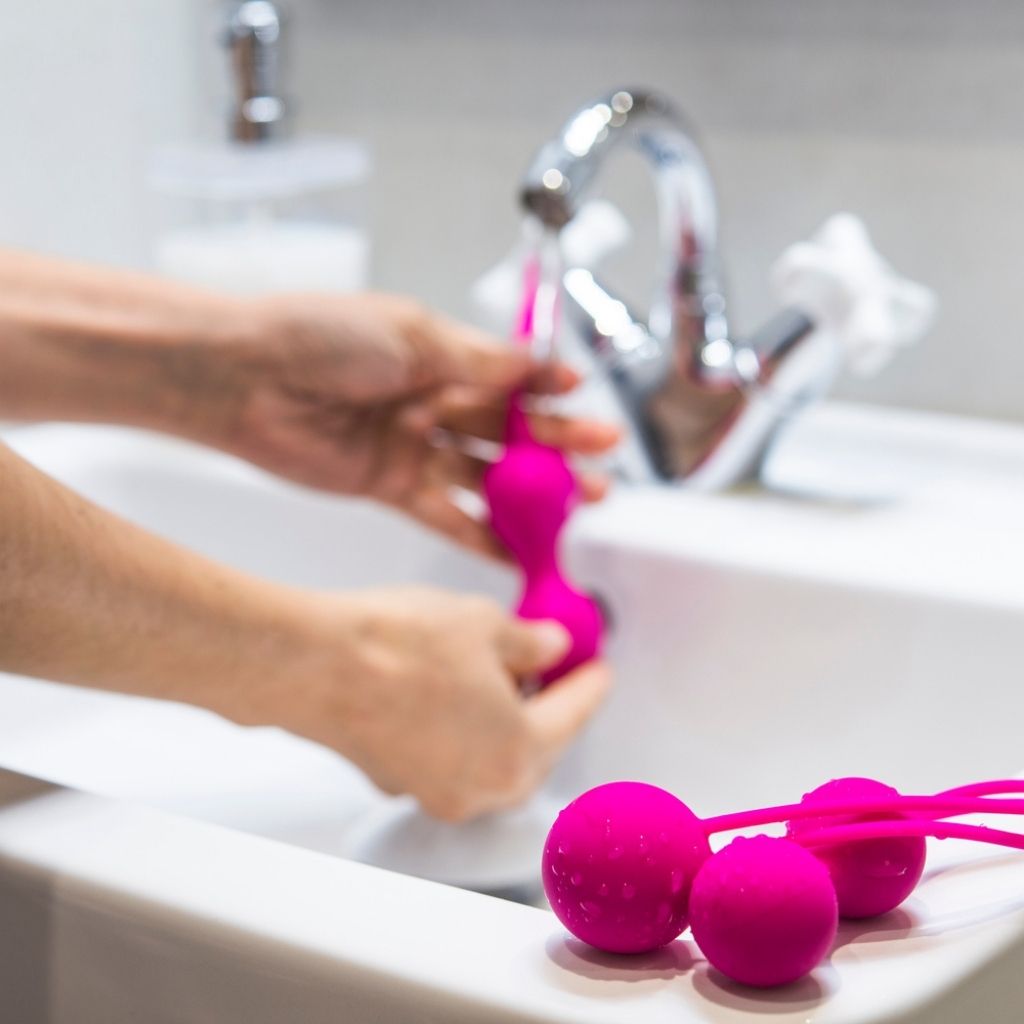A Comprehensive Guide On How To Clean Your Sex Toys. Learn Everything From Identifying Materials, Which Soap To Use And How To Store Your Toys.
Cleaning sex toys might seem like having to switch off the light when you’re already asleep on the bed—or getting up to find the TV remote when you’ve just snuggled into your couch to watch a movie. But we’re not talking about cleaning dishes here; you can’t leave your sex toys uncleaned for days. But the good news is that it’s a lot easier than you might think.
The key to cleaning your sex toys is to know what you’re doing and why you’re doing it.
- Clean sex toys don’t cause infections
- Drying and cleaning your toys will increase their lifespan
- A clean toy stored correctly makes you look forward to your next session, knowing that everything is right and ready when you feel the urge
So here’s the correct way to clean your sex toys and how to identify which kind of toy needs which type of cleaning.
Why Is Cleaning Your Sex Toys So Important?
You'd think it should be obvious but there are quite a few reasons why you should thoroughly clean your sex toys. The general rule of thumb is that you should clean a toy directly after each use. Also, consider cleaning your toy before every use as well, just a quick rinse to get any possible dust or dirt off. You can use a sex toy cleaner for this. I know, it seems like a schlep, especially when you’re riding high on oxytocin after a fantastic orgasm, but it’s a good idea to make this a habit and part of your routine.
A woman's vagina is home to a multitude of good fungi and bacteria to help keep it healthy. When you use a sex toy that comes into contact with your vagina, these microorganisms attach themselves to that toy. This in itself is not really an issue because your vagina is used to microorganisms, and they don’t really pose a threat. The problem comes in if you have an infection or STI and then use the toy to masturbate. That’s when some of the pathogens causing the infection can attach itself to the toy and remain on the surface (non-porous) or in tiny holes if it’s a porous toy where the pathogens will then remain unless cleaned thoroughly.
If you use that toy again later, you risk re-infecting yourself. If you share that toy with a partner, you risk infecting your partner with the same infection even after your infection is long gone. Infections are not limited to vaginal use only.
Anal sex toys pose a similar threat to gastrointestinal (GI) bacteria that cause any number of diseases. This is why anal toys should ONLY be used for anal play, don’t mix this up; it’s a UTI waiting to happen.
Don’t get me wrong, you probably won’t get an infection every time you forget to wash your sex toys, but it’s good to know that it can happen and that it’s preventable.
What Is Your Sex Toy Made Of?
Not all toys are made from the same materials; in our article, the complete guide to sex toys, we go into the details of all the different materials and their benefits, including noise levels and longevity. But here, it’s essential to know what your toy is made of to clean it correctly. You might think soap and warm water will do the trick, but this isn’t always the case.
The first thing you need to figure out is if the toy is porous or non-porous. You can check the box or look it up online if you’re unsure. It’s good to know that even if you clean a porous sex toy, you probably won’t remove all the germs as it would with a non-porous toy. So, it’s better to keep a porous toy just for yourself or use it with a condom when sharing with a partner.
Porous vs non-porous materials - the short of it, avoid porous materials. They gather bacteria easily and are hard to clean. Materials that are considered porous include Polyvinyl Chloride (PVC), Latex (not regulated in sex toys only in condoms) or Thermoplastic Elastomers (TPE). Non-porous toys, on the other hand, are much safer and generally manufactured better. Non-porous materials include glass, medical-grade silicone, medical-grade stainless steel (buttplugs) and Pyrex.
Don’t be fooled by the label. Body Safe doesn’t mean that it is medical grade. In South Africa, anything you buy should be CE-certified to start with. FDA-approved doesn’t mean anything in SA. In some cases, an FDA-approved sex toy will be approved as a food product even though it’s made from silicone. Who can trust a certification system like that? Instead, look for toys that use medical-grade materials. If you’re in any doubt, contact the company selling you or that sold you the toy, they should be well au fait with all the regulations and materials used in the products they sell.
How To Clean Your Sex Toys (Material Specific)
Now that you’ve identified what your toy is made of and why it’s crucial to clean them thoroughly, you can plan on cleaning and storing it properly after each use. Yeah, buzzkill, I know but hear me out.
When cleaning a sex toy, nothing beats soap and warm water. Remember to check if your toy is waterproof or water-resistant. If it’s water-resistant or uses batteries, you need to be careful not to dunk it in water.
Use The Right Soap
Bar soap isn’t a proper soap. I’m not going to go into details; just trust me on this one. What you want to use is a mild dishwasher or antibacterial hand soap, preferably unscented. Your vagina has a natural pH that keeps your microflora in balance. If it’s an anal toy, you don’t want anything other than a pH neutral soap; anything scented is likely to irritate your rectum.
Ingredients in scented soap can really mess with your pH balance, which can make you susceptible to infections.
Now that we have that out of the way, let’s get to the cleaning part.
*Irrespective of how you wash your toys, as described below, it’s essential to properly dry out your toys after each wash and before storing them away!
Non-Porous Materials

If your toy is made of hard plastic, silicone, glass, stainless steel or silicone, they can be considered non-porous toys, and you can clean them with warm water and soap or a soapy washcloth, and if they don’t vibrate, you can boil them.
Silicone - The quickest way to clean non-vibrating silicone toys is to throw them in the dishwasher on the TOP RACK for a good clean. The same goes for boiling toys, only non-vibrating. Never boil a vibrating toy as it will destroy the vibrating mechanism in a toy. But if it doesn’t have mechanics, you can boil it for 5-10 minutes with the LID OFF to properly sterilise them. Waterproof vibrators should be cleaned with warm water and anti-bacterial non-scented soap. They clean fairly easily, and honestly, most vibrators these days should be waterproof.
Glass - Easy to clean but never expose glass toys to extreme temperatures, so opt not to boil them—Wash glass toys with warm soap and water. Pyrex toys are dishwasher safe.
Stainless Steel - If your metal toy is attached to an electrical device, use warm water and soap and take care not to get the electrics wet. If there are no electrical components, you can boil the toys for 5-10 minutes or throw them in the dishwasher.
Hard Plastic - Wash with warm water and antibacterial soap. Do not boil hard plastic toys; they have a lower melting point and will melt.
Porous Materials

I am adding this section as some of you might still have porous sex toys, and some bondage gear falls into the porous category. However, let it be known that Lizzy Bliss does not recommend buying porous penetrative sex toys.
Keep in mind that porous materials are more sensitive to temperature than nonporous toys. They get warped and bent out of shape easily if exposed to too much heat.
Leather - Wipe leather products with a warm damp, soapy cloth or use a leather cleaner. Do not soak leather in water or any other materials; it’ll never be the same again. Consider treating the leather with beeswax or a leather conditioner once it’s thoroughly dry. You can protect any metal parts within the leather with a coat of clear nail polish.
Rubber - Rubber is porous and difficult to clean. It’s also hard to know what materials are in rubber and can contain phthalates that typically get used to harden the rubber materials in manufacturing. There’s no real good way to clean these toys. Use warm water and soap but consider using these toys with a condom.
Vinyl or Cyberskin - Cyberskin is often used for dildos and is soft and porous. You can wash vinyl and Cyberskin toys delicately with warm water and soap only. You can dry them out and add a bit of cornstarch if you want to prevent them from getting sticky.
Nylon - Nylon harnesses, ropes and toys can be washed in a washing machine with mild anti-bacterial soap.
Toy Cleaners

If you’re not in the mood to clean your sex toys thoroughly after a session, you can get away with a sex toy cleaner from time to time, although this isn’t recommended regular practice. A sex toy cleaner is a mild disinfectant and doesn’t replace a good wash.
But if you have a knee-buckling earth-shattering orgasm and you are convulsing on the bed and can’t move afterwards, you can wipe your toy down with a good sex toy cleaner and give it a thorough was later on.
Storing Your Sex Toys

How you store your sex toy matters. I know it’s tempting to chuck it in the drawer after you’re done, but you should consider where you keep your toys carefully. Even if you have a designated spot to store your toys, there could be dust and lint present. Stuff you don’t want inside you!
Here are some options for storing your toys:
- Satin Bags/Pouch - Many toys come with a storage pouch that is ideal for storing your toy. A small silk or satin bag will keep your toy clean and safe and, as a bonus, makes your toy an easy travel companion. If you don’t get one with the toy, consider buying one to fit the bill in size and material.
- Plastic Container - No need to ransack your plastics closet, but you can get a simple plastic tub to store your toys. There are plenty of sealable plastic containers on the market that you can get cheaply. Toys in a container will be sealed and protected from any dust or lint and are easy to pack away. Consider storing your toys in the container in their original packaging. Easy peasy.
Keeping your toys clean will protect you and increase the lifespan of your toys. There’s no downside to cleaning your toys—only a bit of effort.


